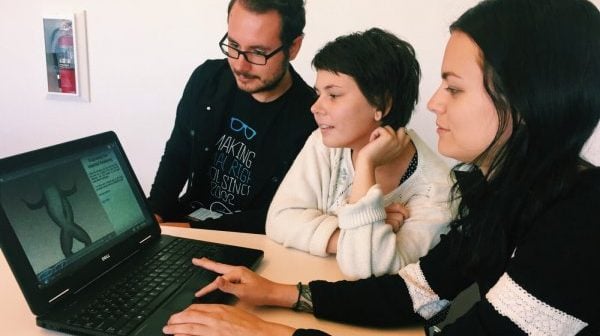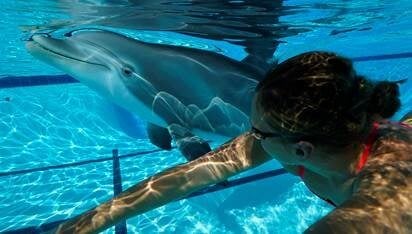Debate Kit: Should Marine Mammals Be Held in Amusement Parks?
A hot topic in classrooms and among the public is whether or not marine mammals should be imprisoned for entertainment. Here at PETA, we campaign for animal rights and understand that animals are not ours to use for entertainment. We know that many schools assign debates on topical issues to help their students learn to speak and write persuasively, practice research skills, and recognize multiple sides of a controversial or multifaceted issue. This student debate kit lists a variety of resources that can be shared with students to support the argument that marine mammals shouldn’t be imprisoned for entertainment.
RESOLVED: MARINE MAMMALS SHOULDN’T BE IMPRISONED FOR ENTERTAINMENT.
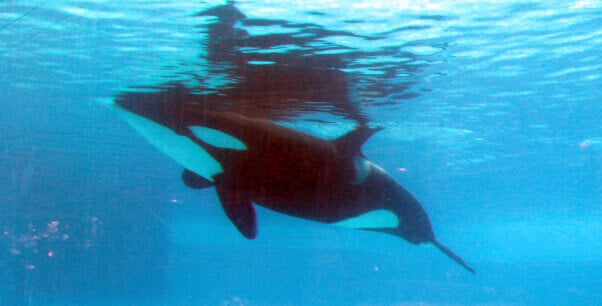
Affirmative Argument
Marine mammals are highly intelligent, sensitive, and social beings, and they suffer greatly when used for entertainment. The chlorine and copper sulfate used to keep tanks clean have caused dolphins’ skin to peel off and may cause them to go blind. Many marine mammals suffer from peptic ulcers, often leading to death, because of frustration resulting from their unnatural lives. Imprisoning animals for entertainment also tears families apart. In the wild, orcas often spend their entire lives with their mothers and siblings and live in large, socially complex groups.
Although the aquarium industry claims that it exists purely for education and conservation, the message these facilities really send is that it’s acceptable to keep animals imprisoned for entertainment in cramped conditions, far from their natural homes, where they’re depressed, lonely, and at the mercy of humans. Marine mammal conservation is achieved by abolishing whaling, cleaning up our oceans, ending driftnet fishing, and prohibiting live captures, not by forcing cetaceans to swim in repetitive circles for our entertainment.
There are countless ways that we can inform the public and cultivate respect for animals without imprisoning marine mammals. It’s time to put the focus on teaching visitors how to protect marine life rather than harming it.
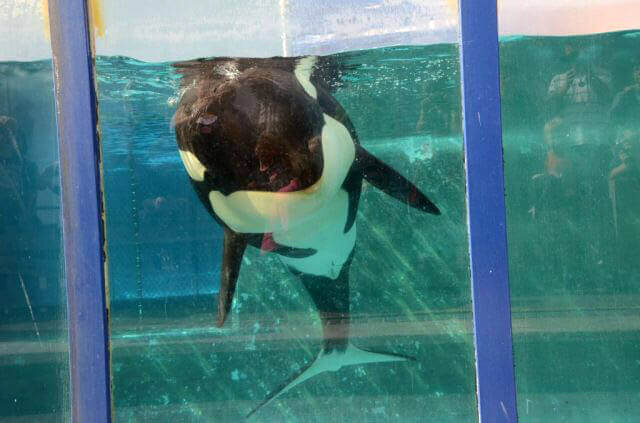
Become an ‘Expert’
Use the following links to research general information about marine mammals used for entertainment and prepare logical arguments.
-
- Aquariums and Marine Parks
- Marine Animal Exhibits
- ‘I, Orca’
- 8 Reasons Orcas Don’t Belong at SeaWorld
- Experts Speak Out About Captive Marine Mammals
- 9 Animals Driven Insane
- Alfonso Herrera Goes Undercover at SeaWorld
- A Summary of the Effects of Captivity on Orcas
- Lives Stolen by SeaWorld
- Capture of Wild Orcas
- Orcas Aren’t the Only Ones Being Mistreated at SeaWorld
- Just Like Orcas, Pinnipeds Are Prisoners at SeaWorld

Build Your Case
Use the following links to gather evidence and examples to support your position against using marine mammals for entertainment.

Research Articles and Investigative Analysis
Witness Accounts and Videos
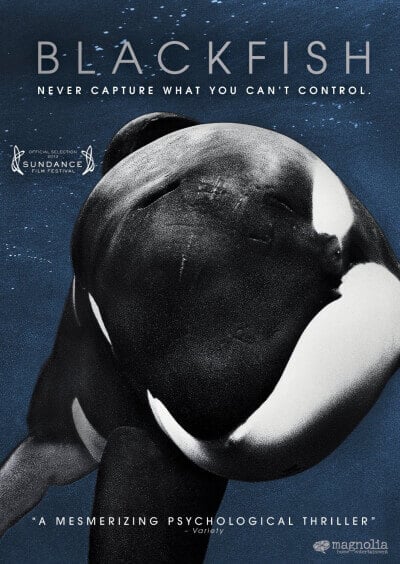
-
- Captive Orca Appears to Smash Her Head Into Gate Over and Over
- Visser Speaks About Lolita
- Note: Following years of campaigning by PETA and fellow animal rights activists, along with the help of philanthropist and Indianapolis Colts owner Jim Irsay, on March 30, 2023, the Miami Seaquarium announced plans to release the long-suffering orca Lolita to a sea sanctuary off the coast of Washington state. Unfortunately, this move came too late. She died in August 2023 after spending more than five decades imprisoned at the Miami Seaquarium in the smallest, bleakest orca tank in the world, deprived of any semblance of a natural life.
- Ric O’Barry’s Dolphin Project
- Former SeaWorld Trainer John Hargrove’s Testimony Before the California State Assembly in Favor of a Ban on Holding Orcas Captive
- Blackfish Official Trailer
- Morgan’s Stolen Freedom
- An Orca Expert Goes to SeaWorld
- Voice of the Orcas (blog maintained by several former SeaWorld trainers)
Documented Physical Evidence of the Suffering of Orcas and Dolphins Abused for Entertainment
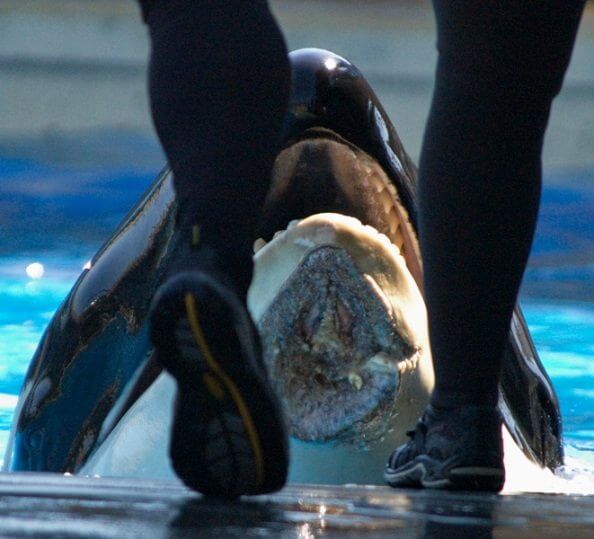
-
- Orca Badly Hurt in SeaWorld Clash
- Orca Has Sunburn Wounds at SeaWorld
- SeaWorld Gave Valium to Whales for ‘Grotesque’ Behavior Uncommon in the Wild
- Video Shows Stressed Captive Orcas and Other Dolphins Biting Each Other
- This Veterinarian Investigated Orca Abuse at SeaWorld San Antonio
- What This Veterinarian Saw at SeaWorld Orlando Isn’t Pretty
- Ex-SeaWorld Employee Gives Chilling New Details About Orca Mistreatment
Finding the Solution
Use the following resources to help build a proposal suggesting solutions to issues that could allegedly arise from ending the use of marine mammals for entertainment.
-
- National Aquarium Announces That Dolphins Will Go to Sanctuary
- Corky’s Life in Captivity
- A Win-Win Solution for Captive Orcas and Marine Theme Parks
- Board Bans Cetacean Captivity at Vancouver Aquarium After Beluga Deaths
- The Whale Sanctuary Project
- The Story of Keiko, the Orca from Free Willy
- Lolita’s Suffering Is Over
Anticipate Counterarguments and Prepare Rebuttals
Analyze aquarium and marine park websites to determine their stated reasons for keeping marine mammals imprisoned. Investigate how much money these companies acquire through ticket sales and other endeavors and think critically about their motivations. Also, examine which other entities benefit from keeping marine mammals imprisoned (e.g., aquarium suppliers, food vendors, scientists who study only captive animals). Create a list of typical statements made by parties who want marine mammal imprisonment to continue. Information included in the links in this document can be used to respond to counterarguments.
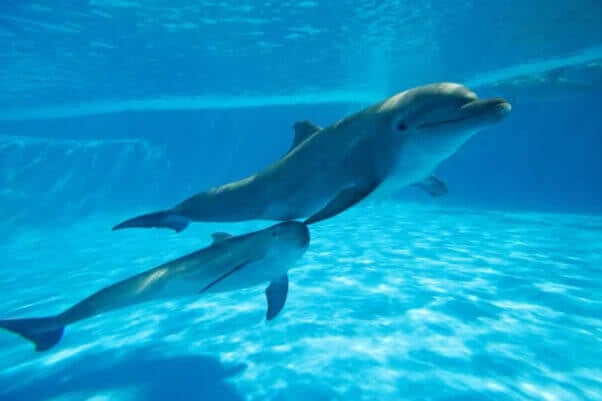
Other Considerations
Additional Resources
Websites
Books
*****
Have students use the curated content in this debate resource kit to prepare an affirmative argument stating why marine mammals should not be imprisoned for entertainment. These resources will assist students in supporting their position using scientific, ethical, and philosophical arguments.
Want free educational posters and stickers for students to use during their debates? E-mail us at [email protected].
Do your students need to conduct an interview as part of their research? PETA staff members are available to students via phone, Skype, or e-mail, including to answer questions about our stance on using marine mammals for entertainment. Have students e-mail us directly at [email protected]—or if you’d like to contact us on their behalf, please fill out the form below, and we’ll arrange for them to speak with a representative.
Thank you for helping your students speak up for animal rights. Happy debating!


